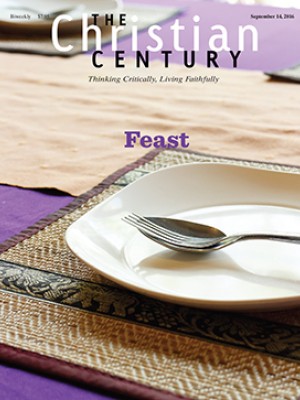September 25, 26th Sunday in Ordinary Time: 1 Timothy 6:6-19; Luke 16:19-31
Luke's story of the rich man and Lazarus is full of vivid details. Which makes you cringe the most?
This week’s Gospel reading sets up a contrast that feels uncomfortably close to home. I live and work in the shadow of a large suburban shopping area. When people ask where we’re located, I often respond with our proximity to IKEA or to the largest indoor mall in Illinois. We’re within 15 minutes of pretty much anything you might want to purchase. The rich man, in his purple and his fine linen, lives up the street from me; I can see Lazarus at his gate from where I sit.
Before I lived here, I shopped here. (By shopped I mean I combed the clearance racks.) I would drive from across town and see only the veneer of high-end stores, well-lit shopping centers, and indulgent restaurants. Now, however, I follow a Bentley to work and pass bicyclists with the whole of their possessions on their back. At our church just down the road from a Jaguar dealership, I administer the congregation’s financial assistance fund, serving those in need who wait at the gates.
Read our latest issue or browse back issues.
These verses of Luke contain vivid details, from the sore-licking dogs to the dialogue between the rich man and Abraham. We can hear the man’s clamor for a drop of water, his begging for a merciful messenger for his brothers. We can see the bone-clinging flesh of Lazarus, the sores that never healed. I think we’re meant to flinch when we read or hear these verses.
What makes you cringe the most? Is it the image of the man in need? Or Abraham’s words that “during your lifetime you received your good things, and Lazarus in like manner evil things”? Do you shudder at the hopelessness of the assertion that “neither will they be convinced even if someone rises from the dead”?
While most days I don’t consider myself a wealthy person, I recognize that by many standards—locally as well as globally—I’m very rich indeed. If I don’t feel it in my bank account, I acknowledge the wealth of my education and experience. It is easy to call others rich but more challenging to see ourselves in that mirror. This doesn’t end well for the rich man.
Sometimes I’m about to duck out of the office, hoping for a pick-me-up from an overpriced cup of coffee, when I hear the phone or someone at the door. I hold my breath. As much as I want to help, sometimes I want to step over my neighbor in need and go about my day. After being confronted (again) with the reality of what it means to struggle, the coffee shop becomes a distant memory. But more important than how my own spending habits are impacted by these interactions is how we’re all called to live, generously sharing what we have.
It all comes down to money, doesn’t it? We talk about it, worry about it, ignore it, even have dreams and nightmares about it. We wonder how best to use it and imagine all the things we’d do if we had more. We ponder these questions as individuals and families, and as churches and businesses.
The readings this week remind us that this is not a new divide between those who have and those who have not. I’m torn between being thankful for this reminder and feeling exhausted that nothing has changed, seemingly in forever.
And I wonder where we find words of hope and promise, particularly in communities where the leaders of Fortune 500 companies sit in the pew next to people who spent the night in our shelter. Though when that happens, I honestly believe that the kingdom of God has come near. I struggle to hold back tears when I place the body of Christ into their hands, one after another, beggars at the same table regardless of how they arrived there.
I don’t know where you are with money. I don’t know if it’s your friend or your enemy. On any given day in my life, it plays both roles. And ultimately, it’s not money itself that the letter to Timothy speaks against but rather the love of it. It’s the obsession with obtaining more (and more and more and more) that troubles our hearts and causes pain. Our rich man in the Gospel ends up where he does because of how he treats a fellow human being, not because of his bank balance. But that doesn’t excuse us from examining our relationship with money, particularly as many of us stare down stewardship season.
What these scriptures remind us is that there’s something bigger and even better to set our sights on than a growing account balance. There is another way to live, a way that reflects the gift of eternal life and gives us hope beyond doubt, strength beyond despair. God has set forth a different way: a way of godliness and faith and endurance and love and gentleness.
What would our lives look like if we worried as much about marking them with love or filling the world with faith as we did about our money? Perhaps we would take time for daily prayer. Or maybe the focus of our pursuit would be gentleness, and we would approach each post on Facebook or Twitter with a gentle spirit and the grace God gives us. Maybe instead of viewing the world through the lens of cynicism, we could see it with eyes of love. Perhaps generosity would motivate us instead of fear. Maybe pursuing these things means putting down your bowl of wine and kneeling to drink from the chalice.
Whatever pursuit redirects our ways, we have already been given eternal life. This is God’s gift to us, a way that is ours already.





